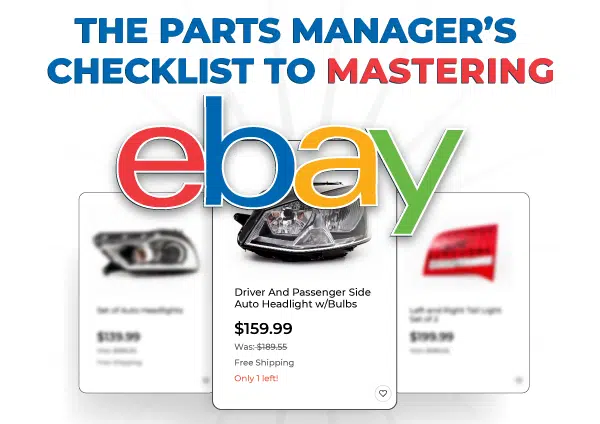Specialty automotive parts manufacturers who choose to sell their parts online, particularly through suppliers and third-party marketplaces, often find themselves facing a significant drawback – the loss of control over their brand and a loss of easy access to consumer data. However, implementing a Direct-to-Consumer (D2C) model can help manufacturers regain control.
Combined with a robust eCommerce platform, this model puts the power back into manufacturers’ hands, helping them directly manage their brand while building meaningful relationships with their customers.
The Challenge: Losing Brand Control When Selling Online
Today, the online marketplace offers a vast sales landscape filled with possibilities. Yet for parts manufacturers, it can also be a labyrinth where brand control easily slips away.
Traditionally, parts manufacturers have relied heavily on suppliers and third-party marketplaces to sell their products online. While these avenues can help reach a wide array of potential customers, they come with a significant downside—manufacturers often lose the ability to directly manage their brand identity.
This lack of direct control can lead to inconsistent branding, where the same product may be represented differently across various platforms. This inconsistency can create confusion among customers and dilute the manufacturer’s brand identity, leading to misalignment between the manufacturer’s vision for their product and its actual portrayal in the market. All these factors can impact the customer’s perception of the brand and ultimately influence their buying decisions.
Selling through suppliers or third-party marketplaces often results in a significant loss of valuable consumer data. These platforms generally keep customer data to themselves, leaving manufacturers in the dark about who is buying their products and why.
This lack of direct customer insight hampers manufacturers from effectively tailoring their marketing efforts and from making informed decisions about product development and improvement.
In essence, the traditional way of online selling poses a significant barrier to brand control and customer data ownership, challenging manufacturers to find new ways to navigate the digital landscape.
Understanding the D2C Model
The Direct-to-Consumer (D2C) model is a strategic approach to eCommerce that is shifting the tides in the digital marketplace. In essence, D2C allows specialty automotive parts manufacturers to sell their products directly to consumers, bypassing traditional intermediaries such as wholesalers, retailers, or third-party marketplaces.
By doing so, manufacturers regain the steering wheel and are once again in direct control of their brand and customer relationship.
First, the D2C model allows manufacturers to decide how their products are displayed and marketed. Manufacturers can align product descriptions, images, pricing, and overall branding to their vision, ensuring consistent messaging across the entire customer journey.
This control extends beyond just product presentation. D2C also enables manufacturers to shape the overall customer experience, from how the website is designed to the customer service provided, down to the packaging and delivery of the product.
Manufacturers can create an immersive brand experience that is reflective of their values and resonates with their target audience.
Second, the D2C model unlocks direct access to valuable consumer data. Unlike traditional retail, where customer data often remains with the retailer or third-party marketplace, D2C opens up the data pipeline directly to the manufacturer.
Every interaction a customer has with your brand provides invaluable insight into their behavior, preferences, and purchasing patterns.
This information can be leveraged to fine-tune marketing strategies, personalize customer interactions, and inform product development – all based on actual customer data rather than market assumptions.
Offering manufacturers direct control over their brand identity and customer data opens up new avenues for growth and customer engagement in the digital marketplace.
The Role of a Robust eCommerce Platform in Successful D2C Implementation
Implementing a successful D2C model is no small feat—it requires a robust eCommerce platform that supports manufacturers’ specific needs and goals. For instance, the RevolutionParts platform is specifically designed to aid manufacturers in seamlessly transitioning to a D2C model, equipping them with the tools they need to establish and maintain control over their brand.
Our platform enables you to fully customize your online store to reflect your brand’s unique personality and values. From your site’s layout and design to your products’ descriptions and images, you have complete control over your online presence.
Our platform’s integrated analytics capabilities provide valuable insights into customer behavior.
When a parts shopper comes to your website to purchase a part, you gain valuable information about the buyer, such as their email address, purchase history, and product preferences, which can inform your marketing strategies and product development efforts.
This data can help you create personalized experiences for your customers, ultimately fostering brand loyalty and driving growth.
The RevolutionParts platform integrates seamlessly with your ACES/PIES catalog and includes other key features for easy inventory management and order fulfillment to create a streamlined, efficient operation.
The platform is designed to scale with your business, supporting your growth as you expand your reach and cement your brand’s position in the digital marketplace.
Conclusion
In an age where digital commerce is dominating, maintaining control over your brand is paramount to achieving success. The D2C model, coupled with a powerful eCommerce platform, offers specialty automotive parts manufacturers the opportunity to regain that control, fostering stronger relationships with consumers, leveraging invaluable customer data, and cultivating a strong, consistent brand image.
The control and opportunities offered by the D2C model are proving to be invaluable for manufacturers. So why wait? It’s time to take control of your brand and embrace the transformative power of D2C eCommerce. Contact us today to find out how our eCommerce platform can help you make the shift and propel your brand to new heights.




